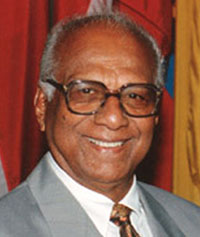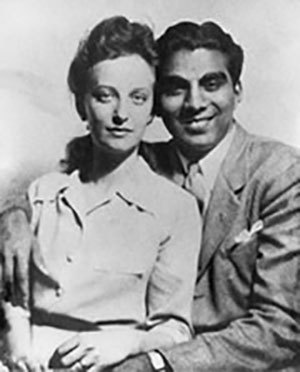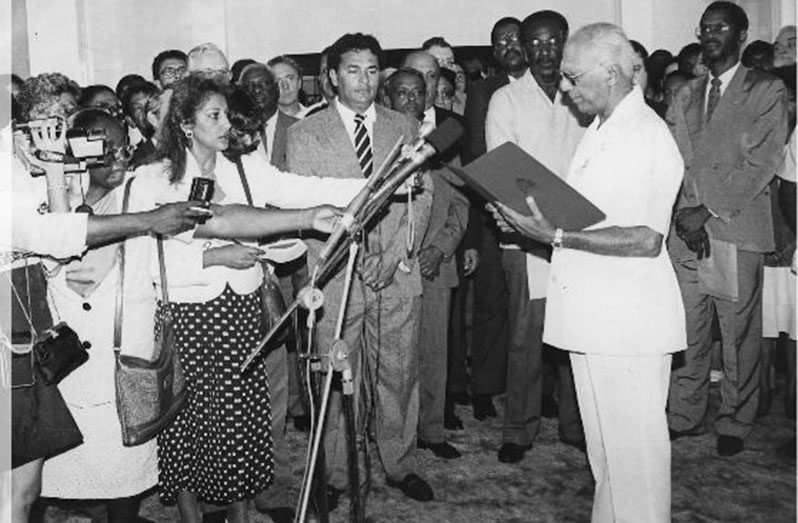By Tota Mangar
IN the immediate post – colonial period, third world countries experienced the need to establish their own set of creditable heroes. This is particularly true of the Caribbean region which emerged out of the exploitative systems of both slavery and indentureship. Some of these new heroes, because of popular creditableness, achieved national acceptance while others, because of a selection process that was questionable at best, endured painful obscurity in the full glare of public illumination. In Guyana, despite our obvious differences, our heroes, perhaps because of the exercise of greater prudence, have enjoyed popular acceptance.

The late Cheddi Berret Jagan is undoubtedly a national hero who, through the crucible of time, has enjoyed, while alive, a popular appeal that set him apart from and above the ordinary. Emerging from the bound-yard of a Corentyne sugar plantation and being the son of East Indian indentured labourers, this anti-colonial rebel waged a highly successful fifty-four year crusade against the excesses of British colonialism, western imperialism and its local manifestations, be it plantation oligarchy or neo-colonial authoritarian rule .
He experienced the wrath of the Anglo- American alliance and local reactionaries in the 1950s and 1960s and, with remarkable patience, dedication and persistence, he endured a prolonged twenty-eight years in the political wilderness while never once doubting the righteousness of his cause and with the firm belief that time and history were on his side. With a wave of new consciousness and vigorous steps for the restoration of democracy there came the inevitable vindication of this great son of Guyana, Cheddi Jagan, as the legitimate representative of the popular will of the people when, in 1992, he swept the polls and emerged as President of the Co-operative Republic of Guyana.
He immediately embarked on a re-building and re-healing process with emphasis on national unity and national consensus. His eventual passing in March1997 was a mortal blow to the nation as was evidenced in the spontaneous overflowing of national grief which engulfed the land of his birth. Indeed, Dr Jagan was an extra-ordinarily gifted man, the Father of the Nation, the likes of whom we may never again see.

HIS FORMATIVE YEARS
Dr Cheddi Jagan, son of East Indian indentured labourers, was born at Port Mourant, Corentyne Coast on March 22, 1918. His parents were staunch Hindus and he himself acknowledged attending many Hindu festivals as a little boy. He received his primary education at the Port Mourant Primary and the Rose Hall Scots School. He then pursued his secondary education at R.N. Persaud ‘s private Secondary School, the only secondary school in the area at the time.
At the age of fifteen he continued his secondary career at the prestigious Queen’s College, in the city of Georgetown. This was the colony’s premier secondary school and entry to that institution at the time was the almost exclusive preserve of the urban social upper class. There he had a distinguished academic career culminating in successes at the Oxford and Cambridge Certificate Examinations. This was certainly no mean feat by a ‘ country boy’ in a big city at that juncture of our colonial history.
It is important to understand the socially fragmented nature of the colonial British Guiana of Jagan’s formative years. The colony was rigidly segmented into basically two distinct social groupings. One was European and white-oriented which enjoyed immense social, economic and political privileges and the concomitant hegemony. The other was largely Afro-Asian and in the main identified with ‘poverty, ignorance, limited opportunities and systematic powerlessness’. Fundamentally, both groups evolved from the plantation economy which determined their respective socio-economic and political consciousness.
Colonialism imposed the institutions of slavery and indentureship in Guyana and thereby provided the impetus for, and shaped the development of, both the economy and society. For a long time the cultivation of sugar-cane and the manufacture of raw sugar for export completely dominated rural life. According to Jagan himself ‘everything revolved around sugar and the sugar planters seemed to own the world. The plantation was indeed a world of its own. Or rather it was two worlds – the world of exploiters and the world of the exploited, the world of whites and the world of non-whites.’
Emerging from this stultifying environment with its social impositions and restrictive opportunities and his outstanding academic achievements at Queen’s College, the young Jagan, in his quest for excellence, sailed to the United States of America in September 1936. There he successfully completed a two-year pre-dental course at Howard University. In 1938 he gained entry to North-Western University for a three-year dentistry programme. Simultaneously, he pursued studies in the Social Sciences and in 1942 he secured both the Degree in Dental Surgery [DDS] and his Bachelor of Science Degree [BSc]
Jagan’s sojourn in the United States of America was not limited to classroom activity. It exposed him to the contemporary forment of a tormented society and he departed America as an individual committed to the liberation process and to anti-colonialism.
ENTRY INTO LOCAL POLITICS
During the spring of 1943 and while Dr Jagan was still in Chicago he met his wife, the former Janet Rosenberg. They got married in August of that year at a simple ceremony at Chicago City Hall.
In October, 1943 Dr Jagan returned to his homeland. He set up his dental surgery at 68 Main Street in the heart of the Garden City. There he quickly established himself as a leading dentist and at the same time he got increasingly interested in trade union activities and also in the roles of organisations like the League of Coloured People and the British Guiana East Indian Association. The Carnegie Library soon became the centre for weekly stimulating discussions involving young radicals and intellectuals and Dr Jagan’s contributions were always pertinent and intrusive. At this early stage it was obviously clear that the young dentist was emerging as a prominent socio-political advocate.
Dr Jagan rose to the position of Treasurer of the Manpower Citizens Association [MPCA] but he was eventually disappointed in the union’s performance. The union was widely seen as a ‘company union’ with union leaders more or less collaborating with the planting interests instead of providing effective representation to the membership.
In 1946 Dr Jagan, his wife Janet Jagan, HJM Hubbard and Ashton Chase founded the Political Affairs Committee (PAC), the forerunner of the People’s Progressive Party (PPP). At the 1947 General elections, Dr Jagan, as an independent candidate and with the full backing of the Political Affairs Committee, contested the Central Demerara constituency and was victorious in spite of the limitation of the franchise, due mainly to the high property and income qualifications at the time. In his victory speech he quite modestly declared ‘We the people have won. Now the struggle will begin.’ Indeed, his long, hard and dedicated struggle for his people and nation really began then. At the age of 29, he was the youngest representative in the Legislative Council at the time. The stage was therefore set for Dr Jagan to emerge as the architect of Guyana’s Independence Movement.
The Enmore Tragedy of June 1948 in which five sugar workers were killed [The Enmore Martyrs] and several injured by colonial police had a lasting effect on his life. On this issue, Dr Jagan himself revealed – ‘At the graveside the emotional outbursts of the widows and relatives of the deceased were intensely distressing and I could not restrain my tears. There was to be no turning back. There and then, I made a silent pledge I would dedicate my entire life to the cause of the struggle of the Guyanese people against bondage and exploitation.’
In the ensuing years this remarkable man did exactly that – he devoted his entire life to the cause of all Guyanese and the working class in particular. That desire, the affinity with the oppressed, the exploited and the down-trodden was to burn brilliantly for approximately half a century until his death in March, 1997.
IN THE LEGISLATURE
In his early years in the Legislative Council, Dr Jagan established himself as a champion of the working class. As their chief spokesman he was critical of the planter oligarchy and other exploitative elements in society. His militancy and robust advocacy won him international recognition as a fearless anti-colonial fighter. It also won him the reprobation and reprimand of the local conservative elements and their expatriate allies.
Of greater significance was the fact that his consistently fearless interventions on behalf of the working man, the unemployed and the dispossessed made him the leading political figure in the colony. As to his radical outlook he assessed – ‘I brought a new dimension to the politics of protest, a continuity between the legislature and the street corner, the legislature was brought to the streets and the streets to the legislature.’ As a matter of fact, his motion in the Legislature to electors of every constituency to have the right to recall representatives after elections, tremendously enhanced his stature and popularity among the Guianese working class at that stage of the country’s history.
In 1949 Dr Jagan emerged as President of the Sawmill Workers Union and the following year the People’s Progressive Party [ PPP] was born with Dr Jagan as Leader, Mr. Forbes Burnham as Chairman and Janet Jagan as Secretary. From then on Cheddi Jagan was kept busy on the legislative front. Political consciousness was increased and at the same time significant gains were realised in terms of workers’ welfare.
From the early stage it was recognised that the PPP’s eventual objective was the attainment of political independence for British Guiana. Towards this end attention was focussed on moderate advances under the Waddington Constitution and the attainment of adult suffrage..
Under a new constitution, and with universal adult suffrage, Dr Jagan led the then nationalist movement, the PPP, to a landslide victory in the 1953 general elections with the party capturing 18 out of the available 24 seats. Unfortunately its term in office was only short-lived.
SETBACKS
Her Majesty Government, highly influenced by the local conservative elite and under considerable pressure from the American State Department, suspended the Constitution and overthrew the legally elected Dr Jagan’s Government after only 133 days in office, “ostensibly to prevent the establishment of a communist state in the only British colony on the South American continent.”
Inexplicably, an interim Government comprising entirely of nominated members, many of whom were rejected at the 1953 polls was installed, in spite of mass protests. This development was indeed a tremendous blow to Dr Jagan and his nationalist movement, the PPP. After all he was unjustly and unceremoniously deposed under the guise of a communist threat. That was followed by intense harassment and detention of himself and his leading activists.
In 1955, the party, Dr Jagan and the nation at large, received a further setback when the nationalist movement was fractured into two groups, a Jaganite and a Burnhamite PPP. Despite this split, Dr Jagan continued the arduous task of nation-building. This charismatic leader, with determination and persistence, led his party to successive victories at the 1957 and the1961 general elections and for a time he seemed certain to lead the country to political independence from Great Britain.
Unfortunately, his administration and the country at large were gripped with violent demonstrations, riots, strikes and racial disturbances surrounding the 1962 Kaldor Budget and the 1963 Labour Relations Bill. This period clearly illustrated the turbulent waters the country had to endure. Loss of several lives and the destruction of properties and the dislocation of people to the tune of hundreds of dollars were the sad reality of life during this dark period of our country/s history.
IN THE POLITICAL WILDERNESS [1964-1992]
At the general elections of 1964 Dr Jagan lost power largely through the Duncan Sandys’ newly imposed electoral system of proportional representation. Even though his party polled the most votes a coalition of the People’s National Congress [PNC] and the United Force [UF] came into office. According to historian, Dr James Rose, the circumstances surrounding the December1964 elections were “one of the grossest acts of political betrayal in the history of British Imperialism.”
As Prime Minister, Mr Burnham shouldered the responsibility of leading the country to independence while his former colleague and by then bitter rival, Dr Jagan, served as Opposition Leader.
This post-1964 period of the nation’s political history saw Dr Jagan in opposition for the next twenty-eight years through circumstances beyond his control. He was the victim of successive brazenly and highly controversial elections during this time. But it would seem that those long years in the opposition brought out the very best of him in terms of commitment, grit and determination. To a large extent, despite tremendous odds he was able to keep his party intact and even solidify it. For a long time he was the foremost voice “defying the debilitating autocracy which rigged successive elections to retain political power and party paramountcy.”
At the same time, flawed economic policies and managerial inefficiencies, production decline, a depletion in foreign currency reserves, shortage of raw materials and spares and a growing national debt took its toll on the national economy. Migration of Guyanese to neighbouring Suriname, Venezuela and Brazil and to the Caribbean and North America increased at an alarming rate.
Quite significantly, Dr Jagan utilised every available opportunity and forum- grassroots, legislature, university, international and global- to analyse the social, economic and political injustices manifest in his country at the time.
He truly believed in unity as a means of attaining peace, progress and prosperity and he unceasingly sought to find novel ways and means of moulding a race and class alliance to effect national liberation. In pursuit of these objectives Dr Jagan was instrumental in the formation of the Patriotic Coalition for Democracy [PCD]. The activities of that organisation, the trade union movement and other liberal forces and individuals, along with strong international support, eventually led to numerous electoral reforms which paved the way for the restoration of democracy in Guyana.
RETURN TO POWER
In October, 1992, under free and fair elections, internationally supervised, Dr Jagan made a historic and triumphant return to office, having been once more successful at the polls. This was indeed a remarkable comeback and ample reward for the long years of unending sacrifice, struggle, courage, dedication and determination. In almost fairy-tale fashion he became Guyana’s first democratically elected President at the head of an innovative PPP/Civic government which began, in earnest, a process of restoration and reconstruction. Improvements were vigorously pursued in the area of physical infrastructure including sea defence projects, rehabilitation of drainage and irrigation systems, upgrading of roadways, bridge repairs and the construction of new health and education facilities. Progress was also made in rural potable water supply and electricity generation.
No other political leader in the modern world of ours has successfully re-emerged in power after such a prolonged period in the political wilderness. On this achievement Dr Jagan wrote, “our victory at the polls was greeted with nationwide rejoicing. The Guyanese people welcomed the new air of freedom and enthusiastically moved to support the new Government’s drive to rebuild the country”.
In his later years he was in the forefront of the just call for a New Global Human Order and debt relief where poverty stricken Third World countries were concerned. This call did receive much sympathetic hearing from both donor countries and lending agencies.
Unfortunately Dr Jagan died on March 6, 1997 at the Walter Reed Army Hospital in Washington D.C. at a critical time in Guyana’s strenuous efforts to rebuild and consolidate democracy. His loss is immeasurable. Perhaps at this stage it is worthwhile to reflect on the words of his wife, Her Excellency, the late President Janet Jagan when she said: “He was not given the time to complete his dreams… to eradicate poverty, to build a strong and independent nation, to consolidate the democracy he had struggled to restore and above all to unite the nation.”
CONCLUSION
Dr Jagan is widely regarded as the Father of Our Nation. He moulded our political consciousness from the late colonial period. His life was one of unswerving dedication to the Guyanese people. In the face of grave difficulties he championed the cause of national unity, social justice and economic development.
He was a model of consistency and was a nationalist, regionalist and internationalist in every sense of the word. While some did not understand his ideological message they all understood and respected his honesty, sincerity, integrity, humility and abiding concern for the needy and oppressed.
Dr Jagan was not only an exceptional political leader with attributes of sincerity, integrity and humility but he was an incredible political historian in his own right. His major works; WEST ON TRIAL, FORBIDDEN FREEDOM, THE CARIBBEAN REVOLUTION, THE CARIBBEAN WHOSE BACKYARD,THE USA IN SOUTH AMERICA, A NEW GLOBAL HUMAN ORDER and a host of other publications bear ample testimony to this. These sources are essential for the study of modern political history of Guyana, the Caribbean and Latin America and the third world in general.
In the annals of modern history Dr Jagan’s career would certainly elicit comparisons with that of other great twentieth century leaders such as Mohandas Karamchand Gandhi, Dr Martin Luther King, Nelson Mandela, Jahawarlal Nehru, Jomo Kenyatta, Kwame Nkrumah and Julius Nyrere.
This month of March commemorates both the birth and death anniversaries of this remarkable son of Guyana. The name Cheddi Jagan lives on.




.jpg)









